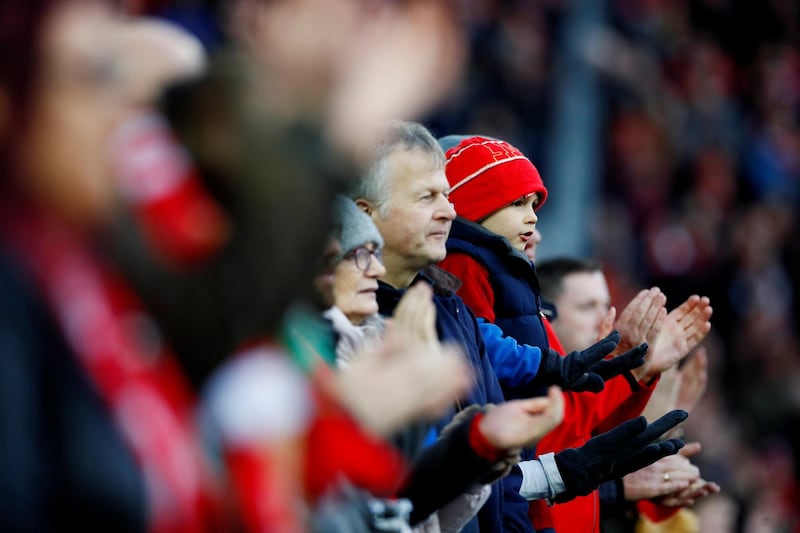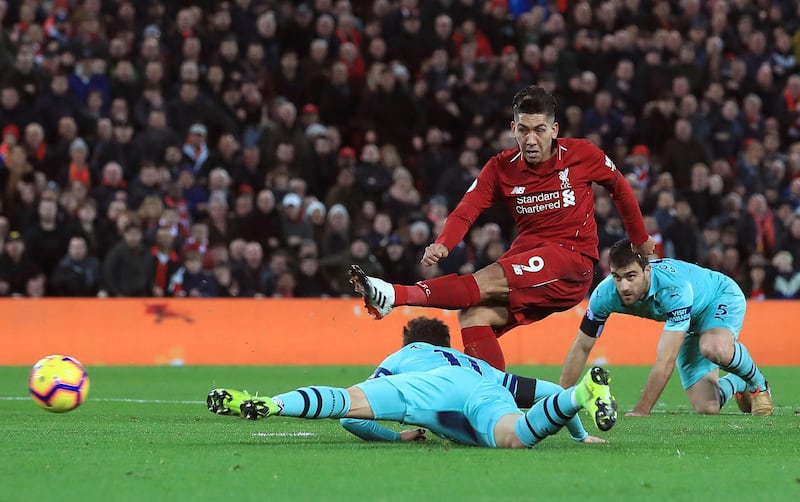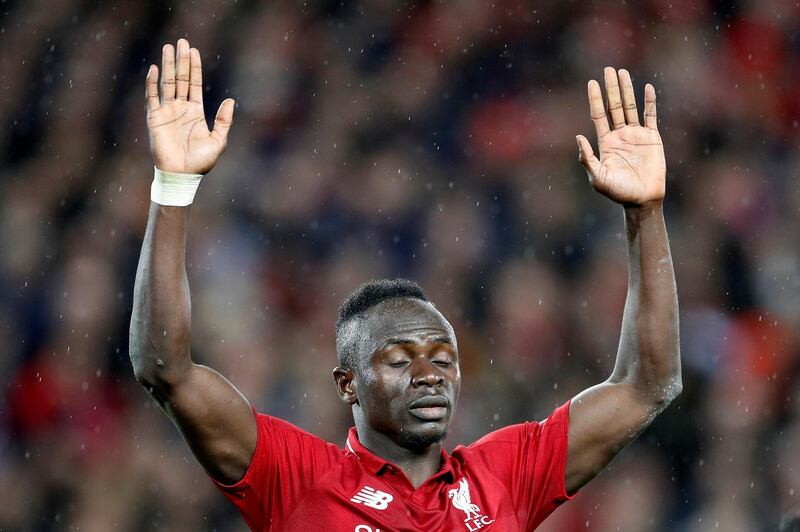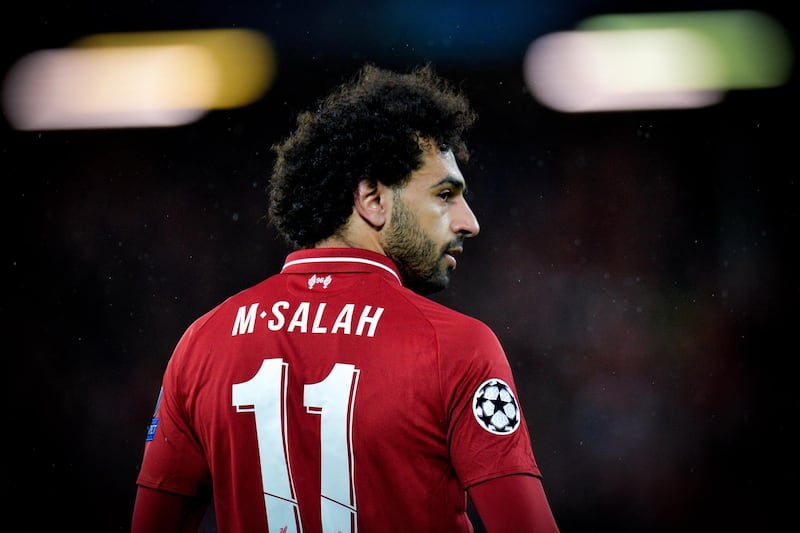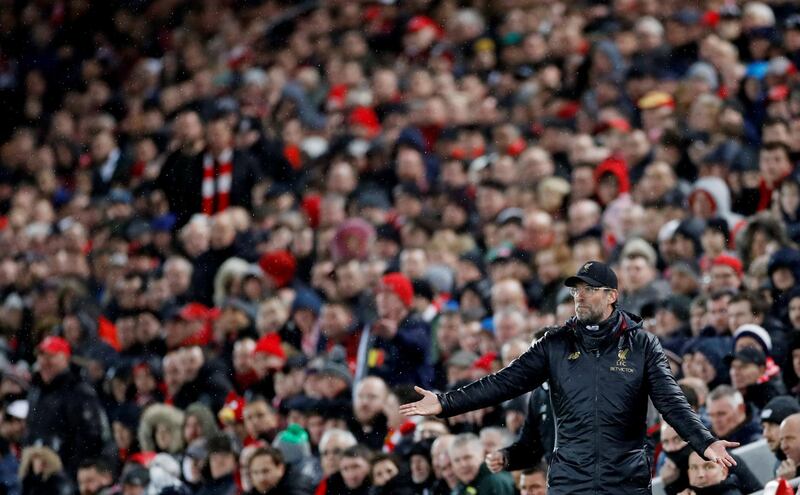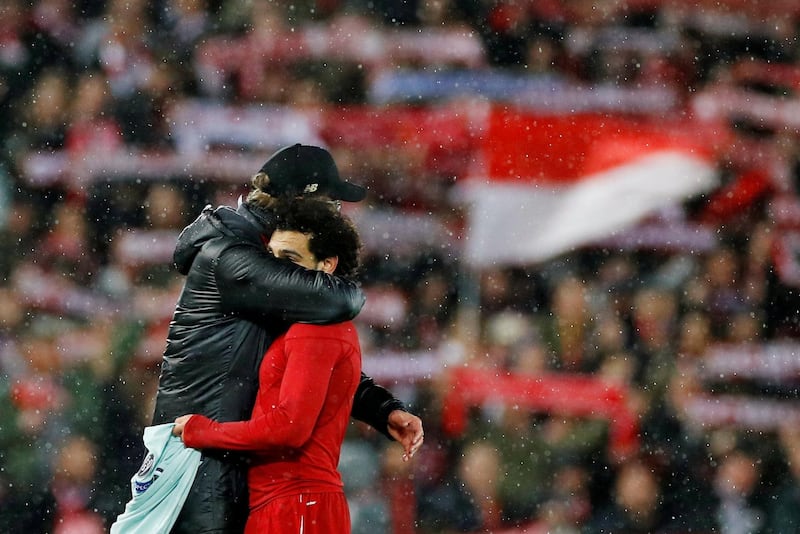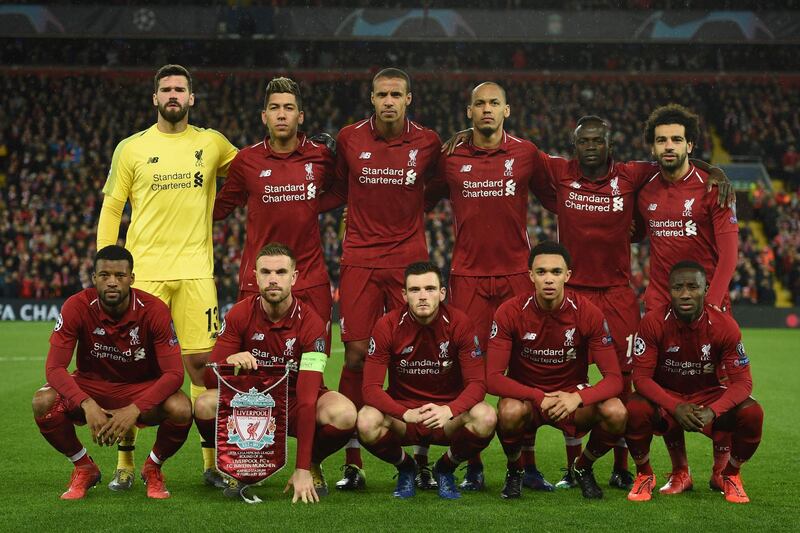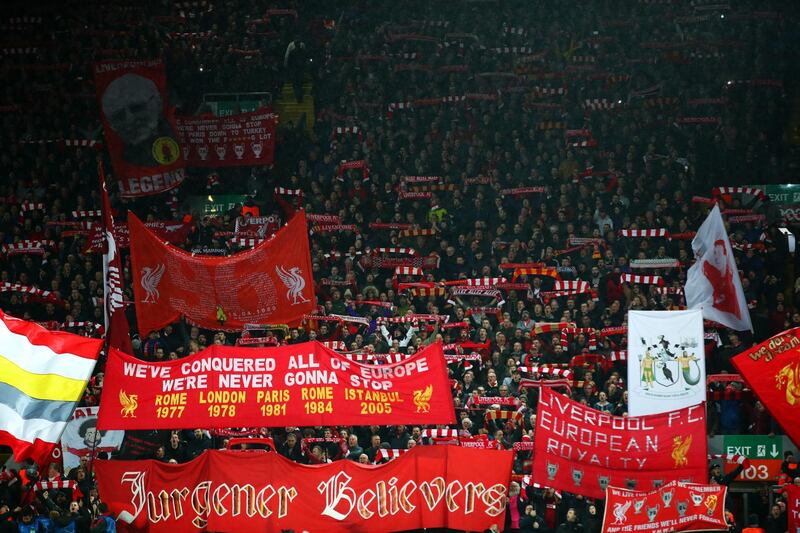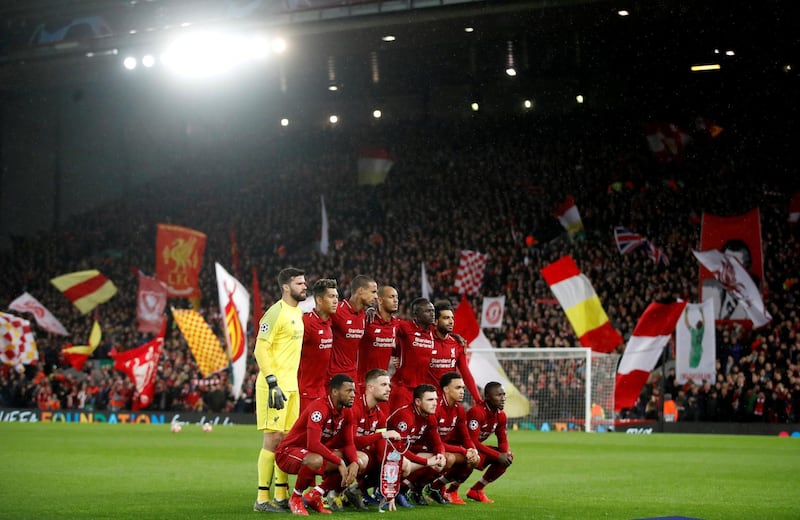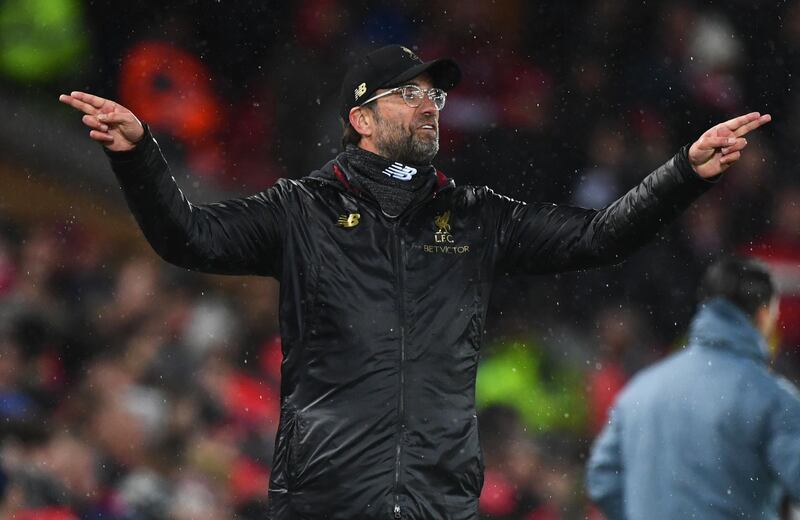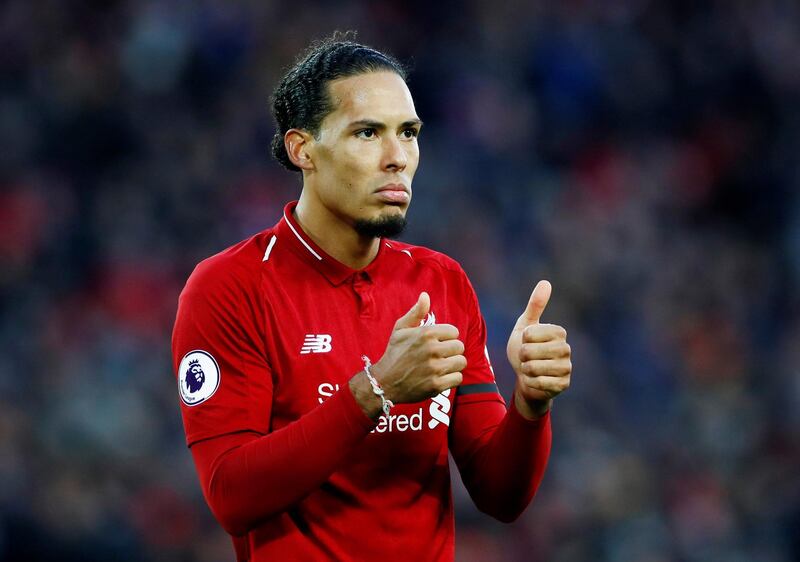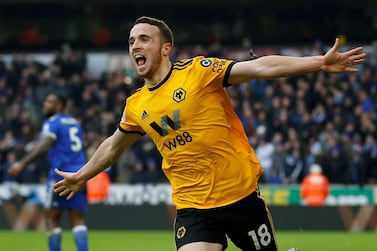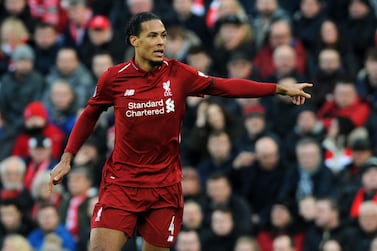“How much mate?”
“£15 (Dh71),” came the reply from the Liverpudlian attendant of a car park close to Everton’s Goodison Park.
“£15 to park a car,” replies this visitor. “It’s not Chelsea.”
“Look if you don’t tell anyone I’ll let you in for a tenner.”
Why the inflated price? The Manchester accent? An attempted scam? It was not the car, an old wreck borrowed from my brother for a trip across the great Manchester – Liverpool divide in England’s north west.
Anfield is a ten-minute walk across Stanley Park from Goodison. On the Goodison side, blue banners hang off street lights marking Everton territory. It’s not quite Belfast, but Stanley Park is the dividing line.
Everton will soon move to a smart new stadium by the Mersey, but for now Liverpool’s giant new main stand, finished in 2016, boosting the capacity from 44,000 to 53,000, is the only structure of either stadium which you can see from a Mersey ferry.
Liverpool chose to stay in Anfield. A decade ago they had seriously considered building a new stadium in Stanley Park, but opted for redeveloping their home since 1884.
They needed to. By 1994, the deadline for English grounds to become all-seater following the guidelines set out after the Hillsborough disaster, Anfield’s all-seated capacity was 41,210, not far off Old Trafford’s 44,000.
By 2006, Anfield’s was still only 45,000, while Old Trafford’s hit 76,000. England’s second most popular club had a ground which was too small for them.
Liverpool has regenerated since and Anfield is much improved. So is their team. When The National visits it is for the home game with Arsenal in December and the mood borders on euphoric among fans on the walk towards Anfield Road.
Liverpool are yet to win any trophies under manager Jurgen Klopp since he took over in October 2015, but this is a fine, exciting side strong enough to reach the Uefa Champions League final last season and to be challenging at the top of the Premier League as they look for a first domestic title since 1990.
Legendary Liverpool striker John Aldridge, who played for the side between 1987 and 1989 walks past and says hello to fans who recognise him.
The terraced houses have been razed to allow Anfield to expand on all four sides. There is space behind the away end for fans to gather – and for a food bank.
“We started it because myself and Dave Kelly, an Evertonian, were sitting in a youth centre in Anfield and we saw a queue of people,” explains Ian Byrne, a Liverpool-supporting local councillor for the Everton area.
“We thought they were waiting for the bingo but they were queuing for a food bank. A girl we knew invited us in and asked us to look at the stock of food – it was pitiful.
"Dave and I asked Everton and Liverpool fans to donate food into a couple of wheelie bins outside prominent pubs before matches. Now, we’ve got a van and we’re collecting 25 per cent of all food going on to North Liverpool food banks. We had ten tonnes of food from the United and Everton games.
“Football fans are creating a welfare safety net because of a government dereliction of duty and the roll out of universal credit. We’re linked with food banks in Manchester and Newcastle. We have animosity and competition between fans over football but hunger doesn't wear club colours.
"Our enemies are not other fans who go to the match in working class cities; our enemies are the people doing this to our communities. There are people in Salford and Manchester in exactly the same position as people in Liverpool.”
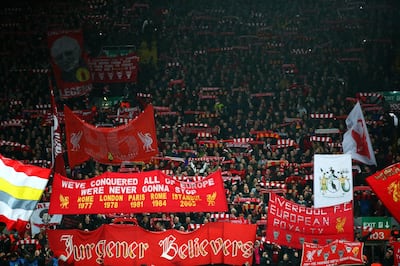
Talk changes to the lighter subject of football.
“Beating Everton in the 1986 FA Cup final was probably my high point as a Liverpool fan, that or Istanbul,” Byrne adds as fans pass by with canned food. “Milan had a great team, we didn’t. A team with Djimi Traore beat them to win the European Cup.”
And now?
“It’s exciting. Last season was really exciting but we conceded too many goals. This season the defence has been much better. They know what they have to do, they’re professional. The new goalkeeper and Virgil van Dijk being the best centre half in the world helps.”
After Ian spoke, Tore Hansen, 51, from Liverpool’s 46,000 strong Scandinavian Branch, the biggest in Scandinavia (Manchester United are second) hands over a cheque for £3,000 to buy food. Hansen has been involved with the branch since it started in 1980.
“I remember Bill Shankly stepping down and reading a story about how Liverpool worked, how they promoted from within,” he says in explanation of why he chose Liverpool. “I thought that was special and different.”
Hansen watched Liverpool nearly 40 times last season – his holiday home, also used by another Norwegian Liverpool fan, is in Liverpool. Hansen recalls how different things were when he travelled to Anfield for the first time in 1985.
“A League Cup game against Fulham and there were 12,000 here," he recalls. "We used to be good but then something changed. Or maybe there were too many changes, not just in the team but in the back room staff too and also the way of thinking.
"Liverpool didn’t catch up with other teams when the Premier League started and we lost out, but this is the first time that I’ve felt we can genuinely win the league from the start of the season.”
Liverpool have been optimistic before.
“I did think we’d win the league in 2014 when we beat Man City, but I also felt that we were still missing something,” says Hansen. “Now, I’m more confident, especially with the presence and leadership of Van Dijk.”
In 2014 when Liverpool finished second, seven other clubs had a better defence.
Peter Hooton, a lifelong Liverpool fan and lead singer of the band The Farm approaches and we walk down Anfield Road, past beautiful Victorian mansions backing onto Stanley Park.
One, Epstein House, was owned by the father of The Beatles manager Brian Epstein and has been turned into a B&B full of Beatles memorabilia.
Such houses would cost 10 times more in London’s W4 rather than Liverpool’s L4, a deprived area, but they were built when Liverpool’s wealth, like nearby Manchester’s, surged during the industrial revolution.
The 1863 Bradshaw’s Guide underlines Liverpool’s 19th century boom. “The best building, and perhaps the finest in all England, is St George’s Hall, opposite Lime Street rail station. It is surrounded by Grecian columns of truly magnificent proportions.”
The docks and the river, from which Liverpool traded before the world’s first inter city railway opened to Manchester in 1830, are described as “the grand lions of the town”.
All of which was a long way from the tight terraced streets around Anfield which were in drastic need of improving. That is coming and the redeveloped Anfield is central to it, but the football club didn’t help for years as they bought up housing closest to the stadium with the intention of demolishing it when they expanded.
Boarded up properties contributed to the area’s decline, which is now being reversed. Central Liverpool is also far smarter than it was thirty years ago, an improvement to which retaining the historic building has been key.
“We’d joke in the 80s that Liverpool would become the new Amsterdam, a post-industrial tourist attraction,” Hooton tells me. “That has happened. The Beatles and football is the main reason why people visit and it’s mainly Liverpool rather than Everton. Yet two miles from the city centre there’s deprivation.”
We arrived at the Hotel Tia (This is Anfield) where fans have packed into the garden, singing along to local singer Jamie Webster's version of Allez, Allez, Allez, Liverpool's modern day anthem. It started in a Champions League game at Porto in 2018 and became the soundtrack to the epic run to the final against Real Madrid in Kiev.
“We’ve conquered all of Europe,” they sing.
“We’re never gonna stop,
“From Paris down to Turkey,
“We’ve won the lot,
“Bob Paisley and Bill Shankly,
“The fields of Anfield Road,
“We are loyal supporters,
“And we come from Liverpool,
“Allez, allez, allez.”
Hooton is recognised and respected in Liverpool. He points out how the current rise has caught even the club’s biggest and most knowledgeable fans by surprise – and who was responsible for it.
“None of us expected that European run. Virgil van Dijk was a huge factor. He’s unbelievable. I asked my dad if it’s the same as when Ron Yeats came into the team (in 1961) and he said: ‘No, he’s even better’. He’s the perfect centre back.”
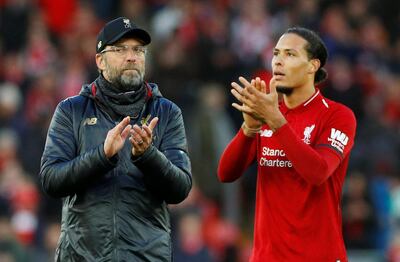
Van Dijk’s £75m 2017 transfer from Southampton was once openly ridiculed as overpriced. Not now.
“I saw him playing for Celtic a few years ago and he was head and shoulders above anyone,” says Hooton. “He didn’t even sweat and I couldn’t understand why nobody had come in for him.
"Of course, he has to win something and he has to prove himself over a number of seasons like Hansen and Lawrenson, but if I was to pick a centre half for my all-time favourite Liverpool team, Van Dijk would be the first name. He’s got everything.
"He was a striker as a kid and you can see him creeping forward during games. I saw some Southampton fans saying that when he played there, he would get bored and drift into midfield and attack because he wants to be in the action. The two goals he scored for Holland against Germany were striker’s goals.”
Van Dijk’s signing happened because Mike Gordon, a hugely influential force behind the scenes at Anfield, urged patience and for Liverpool to push harder when they identified the Dutch defender as a target.
That upset Southampton in June 2017 and Liverpool issued an apology after Southampton complained to the Premier League about their conduct.
Burnley’s Michael Keane was then strongly linked with a Liverpool desperate to improve their defence, but the club felt that only Van Dijk could transform their team, even if they had to wait six months for him and the team suffered in the short term. Liverpool returned six months later, got their man and they have called it right.
It was the first time that Klopp’s Liverpool did not settle for second or third choice with one of their transfer targets, as they usually did.
In 2006, Liverpool wanted Nemanja Vidic, who instead chose Manchester United. Liverpool got Daniel Agger instead, a good defender, but not in Vidic’s class.
Liverpool could afford to do this because of burgeoning revenues. In April 2011, after rivals United had just reached a third Champions League final in four years, Liverpool were nearly bankrupt or “a day away from being in administration” according to a leading club executive.
Two Americans, Tom Hicks and George Gillett, who had taken control in 2007, were run out of town complaining of an “epic swindle” and suggesting that they had been cheated out of “millions of dollars”.
They were bought out by compatriots from Fenway Sports Group, who have not taken a penny of personal profit as they have revitalised Liverpool’s fortunes.
Appointing Klopp, who had previously rejected both Liverpool and United, in 2015 was smart.
Backing his judgement in the transfer market proved even smarter, then increasing match day revenues by finally expanding – and filling - Anfield. They did that with a £110m loan from Fenway. Matchday revenue climbed from £62m to £81m in a stroke.
A new £50m training ground in Kirkby is planned, a further stadium expansion too once feasibility studies have been completed. The ground that could not grow will likely become the second biggest in England.
In May 2018, Liverpool announced an annual pre-tax profit of £125m on a revenue of £455m. Liverpool’s revenue in 2013 was £206m.
True, Liverpool did sell Phillipe Coutinho to Barcelona in this period, but they could also afford to re-invest that money in Fabinho, Xherdan Shaqiri, Naby Keita and goalkeeper Alisson Becker.
Burgeoning media, match day and commercial revenues as Liverpool signed up sponsors helped, as does the club’s popularity in Asia.
After decades of lagging behind United, Liverpool began monetising their vast support, which buys 1.5 million home replica shirts.
The club smartened their act with the media too. In Michigan pre-season ahead of a game against United watched by a 105,000 crowd, Klopp mingled with travelling fans the night before the game.
His opposite number, Jose Mourinho, scowled at anyone near him and refused to do any media beyond contractual obligations.
The positive vibe carried over into this season where, at the halfway stage, Liverpool had a Premier League record points total.
They also had more points than their great side of 1978-79 and had conceded fewer goals than that side.
Historically, only one team did not become champions after going their opening 20 games without a single defeat, Sheffield United 108 years ago. None of this will mean much if Liverpool don’t kick on to take the title for the first time since 1990.
Despite their progress, Hooton is very cautious about Liverpool’s prospects and doesn’t want fans getting carried away until they actually have the league won.
He had heard the commotion a few days previously when Manchester City’s defeat at Leicester City was relayed to ecstatic scenes at Anfield.
Hooton’s just written a book on the Anfield Boot Room and feels that their philosophy served Liverpool well – even when they won four of their five European Cups between 1977 and 1984 they never got carried away and began looking for what they would win next.
“Liverpool fans who’ve seen us win everything are like that,” says Hooton. “We had a great team in 2009 and winning the league was possible, but United had (Sir Alex) Ferguson. Rafa Benitez (Liverpool’s manager) said that Liverpool were like a second hand BMW.
"We could deal with the corners and the bends but when we were on the long straight towards the finish we were up against Lamborghinis (of United and Chelsea).”
Liverpool could not compete with United for players because they did not – and still do not – have United’s resources, nor did they have United’s youth system. But they do have Klopp.
“Klopp is different,” says Hooton. “He has a Shanklyesque mentality.”
Liverpool also came close to winning the league in 2009 and 2014.
“We never threw the league away; we just weren’t good enough,” Jamie Carragher told this writer in a previous interview. “In 2009 we came close but United beat us.
"That was the best Liverpool team I played in. The spine of our team was as good as yours, if not slightly better, but United had Ronaldo, that special player in a wide area which we didn’t have. We had Dirk Kuyt, a good player. Same with Albert Riera. But they’re not Ronaldo.”
In 2014?
“It was a missed opportunity," he added. "We had the best player in the league, Luis Suarez, by a mile and he was one of the best players in the world. We had no European football that year either. United had Moyes; it was Mourinho’s first year at Chelsea. So many opportunities there for Liverpool and we missed it.”
Liverpool’s success in the 1970s and 1980s came through excellence, consistency and that boot room spirit, but also because United failed to capitalise on their popularity.
“Peter Robinson and John Smith, who were in charge of Liverpool, always predicted that if United ever got their act together on the field they were going to leave us standing,” said Hooton.
That United’s act came together and coincided with the Premier League’s millions and the necessary implementation of the Taylor Report all created the perfect opportunity for Liverpool’s arch rivals.
“Old Trafford had space to expand, Anfield struggled,” explains Hooton as he stands with his back to Liverpool’s main stand 90 minutes before kick-off.
“We were told that it wasn’t possible to develop Anfield. They told us we'd have to move to a new stadium, yet it was possible as we see now. FSG expanded it and it’s an investment for them.
"We’re still at Anfield with its heart and soul, but fifty per cent of that stand is corporate and we have the same tourism influx as United. Fans have been priced out of going to games, but that doesn’t cause friction when you are top of the league. It causes friction when you’re mid-table.”
Liverpool are top, which is not easy for fans of their biggest rivals, United and Everton, to digest.
“Everton have been in the doldrums for so many years that they don’t want Liverpool to succeed,” Hooton continues. “It’s an insular thing, it’s not healthy or the right mentality. Up until the 60s Everton were successful and the Mersey millionaires.
"In the 80s Everton had a great team, but that has changed. The rivalry has become pretty unpleasant, but we have things like the food banks which bring fans together.”
We walk down a backstreet alley towards The Twelfth Man public house, a large Victorian building which is packed with hardcore Liverpool fans on both floors.
The sense of community is strong and Wolverhampton Wanderers are playing Tottenham Hotspur, now viewed as a major title rival to Liverpool, on the television screens.
Stephen Monaghan, a 59-year-old Halewood car plant worker, sits in the upstairs corner, a Scouser who has travelled to 115 European away games since the 1970s.
Kenny Dalglish is the greatest Liverpool player he has ever seen, winning the European Cup in Rome in 1984 his greatest moment. The Hillsborough disaster in 1989 was obviously the lowest.
“I did believe that Man City were the best team in England but we have a belief that we can challenge for the title,” he says. “I never ever thought that we would go so long without winning the title but when we were winning those European Cups and league titles we became nonchalant.
"We won the league at Notts County one year in the 80s and I just went home after the game as if it was something we did every year.”
The hope is back.
“Klopp is a fantastic manager who is right for Liverpool,” Monaghan says. “I’ve been fortunate to see Liverpool win five European Cups and the majority of their 18 league titles. Hopefully there’s another one on the way.”
Liverpool’s 18 title haul was once seen as insurmountable. Manchester United surpassed it as Ferguson achieved his aim of knocking Liverpool off their perch.
Yet Ferguson also had a respect for Liverpool and little time for the nastiness which has marred the rivalry with United. He was one of the first visitors to Anfield after Hillsborough, one of the first to write to Jamie Carragher after he retired.
A roar goes up. Wolves have equalised at rivals Spurs. Two further cheers go up followed by a chant of “Liverpool top of the league.” Wolves score a second and a third. The mood is carnival on Walton Breck Road behind the Kop. The accents on the street are Scouse, Scandinavian and southern English.
There are 30 minutes to kick-off and Stephen F Kelly, author of a dozen Liverpool books including the club’s official history, sits in the Homebaked cafe behind the Kop. It is co-owned and co-run by people who live and work in the area. Scouse pie (lamb, onion, carrot and potato) and Shankly pie are on the menu.
Kelly also enthuses about Van Dijk as much as about the pies on sale.
READY for the weekend. 👊🔴#FridayFeeling pic.twitter.com/bJPkcEx8Ir
— Liverpool FC (@LFC) February 22, 2019
“He’s got presence, he’s composed, agile, fast and he’s a leader who organises the defence and younger players like Andy Robertson, Joe Gomez or Trent Alexander-Arnold," he said. "Liverpool didn’t have that before. He’s scored a couple of goals too.”
Kelly rates this Liverpool team as good as any of the 1980s’ line-ups. “I was taken by the Luis Suarez side which was very exciting and that slip from Steven Gerrard against Chelsea was very unfortunate, but this team is better because it doesn’t concede goals; it scores them.”
If Van Dijk is the man of the moment, then Mo Salah was Liverpool’s best player last season.
“He’s still very important,” Kelly opines, “but not as important as last season. Klopp is a fantastic manager, a likeable character. Every club in the country would like him.
"He has enormous similarities with Shankly: he’s enthusiastic, he’s honest, he delights in seeing the team play. He doesn’t criticise his players in public, he’s connected with the city and was very supportive of the Justice for the ’96 campaign, as was Rafa Benitez.”
Kelly used to live near the Cammell Laird shipyard, which gave the world many famous ships including RMS Mauretania and HMS Ark Royal, but work took him west, making him that rare breed, a Scouser who lives in Manchester.
His son Nick, 30, is not a typical Liverpool fan. For one, he was born, raised and lives in the fiercely rival city of Manchester, but rather than support local heroes United or City, he chose the team of his father.
“I’d love Nick to see his team win the league,” says Steve.
Nick follows Liverpool everywhere and has watched football in 40 countries. He started last season among 100 travelling fans in Hong Kong last July on Liverpool’s pre-season tour and finished it in Kiev for his 62nd and final Liverpool game that he’s watched in person since then.
“I grew up in school with United dominating and, for the most part, Liverpool as also-rans. And the times when we have challenged it has fallen apart quite quickly; in 2008/09 with the fall out with the Americans and 2013/14 with the sale of Suarez and subsequent departure of (Raheem) Sterling and retirement of Gerrard.
ICYMI, Steven Gerrard will play for the #LFC Legends in next month’s @LFCFoundation charity match against @acmilan Glorie at Anfield. 😁https://t.co/C3YPjrEooP
— Liverpool FC (@LFC) February 22, 2019
“I even think the success in Europe makes it that bit more frustrating. In the last fifteen years we’ve reached three Champions League finals and a Europa final, which is a great record considering there were quite a few years when we weren’t in either competition. In the same period Arsenal reached one final and one semi-final and qualified year after year.”
There’s an expectant atmosphere inside Anfield, but after going a goal down, Liverpool hammer Arsenal 5-1. Anfield is buzzing, the Kop loud. There are huge flags for Bob Paisley and Sir Roger (Hunt), plus one stating: “We are the famous, the famous Koppites.”
Rivals fans can find the cloying flags and logos nauseating, including the ‘We are Liverpool. This means more,’ title of a film about Liverpool. One Liverpool flag even had its own website and merchandise. But Liverpudlians are unashamed to wear their hearts on their sleeves when it comes to their club.
The Kop sings a chant for Mo Salah to James' (from Manchester) Sit Down and another for Van Dijk which goes "He's a centre-half, he's our number four," to the tune of Dirty Old Town, written by Salfordian Ewan MacColl.
“Watch him defend, and we watch him score, He’ll pass the ball, calm as you like He’s Virgil van Dijk, he's Virgil van Dijk.”
Brazilian Roberto Firmino scores a hat-trick and is man of the match, Sadio Mane gets one as does Salah. Liverpool’s bench, containing Naby Keita, Jordan Henderson, Daniel Sturridge, Adam Lallana and Simon Mignolet is far stronger than in recent years.
Klopp is charismatic afterwards. Journalists laugh when he says “I really wish that you would switch. You come here and I go there – though I keep my salary and not yours".
He wants to dampen title talk, to keep grounded and said: “I’m not the smartest person in the world but it’s means nothing how many points you are ahead in December.”
Klopp thinks the champions will need 105 points to win the league this season but he praises his side’s reaction after going behind, saying: “Brilliant, absolutely brilliant."
This writer leaves Anfield for the walk back across Stanley Park. There are a few people by the Hillsborough memorial where the word ‘dad’ features more in the many flowers than any other.
Only now, almost 30 years after it happened, do fans feel they are getting justice for the 96 who lost their lives so unnecessarily.
It’s dark, deserted and dimly lit on the park, the red lights from the cranes of the construction boom in the city centre clear two miles away.
I’m nervous and think of the stereotypes that I’d been indoctrinated into as I grew up in Manchester with a father who refused to set foot in what he considered to be the enemy territory of Liverpool.
All Scousers were lazy, workshy thieves who couldn’t speak properly, apparently, if you listened to him. You are susceptible to such prejudice at 15, yet the same father would take his children to caravan sites in North Wales and happily converse with fellow divorced dads from Liverpool about football and how the policies of the Thatcher government decimated industry in England’s north and led to them both working a three-day week.
What would he think if I were to get mugged now in the blackness?
Another figure walks close behind. It’s now almost pitch black.
“I can’t see anything,” I say to the figure in an accent which is clearly not Liverpudlian.
“Not great is it,” comes the reply in a Scouse accent. We walk together.
“Been at the match?” he asks before explaining that he worked in security at the stadium. “I signed up in ’89 after Hillsborough. I had a background where I could help with safety and I’ve been there 29 years.”
My companion explains how Anfield is safe, though they have issues when some Everton fans only enter the stadium after You'll Never Walk Alone has been sung. We're soon back in Everton territory, where we say our goodbyes.
Evertonians will be as upset as Man United fans if Liverpool win a first title in 29 years. Can they?
"Why not?" says Gareth Robbo from The Anfield Wrap podcast. "As it stands it's in our hands with 12 games to go. Win all of them and it's guaranteed, despite the inevitable 'City will win it' love-in that seems to be everywhere. Of course I don't know what will happen, but I think we'll win it.
“I don’t really get a few things about the way people talk about situations like this. Why be torn up by the worry of what potentially might not be? Why make up rules about not getting excited until it’s done? I’m enjoying the ride and enjoying Liverpool winning.
“I’ve watched some rubbish Liverpool sides down the years, and there have been plenty of full seasons where we’ve finished the season with less points than we have now, never mind what we could have accrued by the end of the season.
"Three seasons ago Liverpool finished the campaign with 60 points. Four seasons ago it was 62. This season we already have 65 in the bag with a dozen games to go and a title to go for. These are good times and should be treated as such.”
“I just want to see us lift it once!” adds Nick Kelly. “Because so much time has passed, combined with our previous success and United's resurgence, it has become such a big prize for us and so much importance is placed on it.
"I do think that even if we don’t win it this year, and I think United might beat us on Sunday, that we’re in a better position than we've been since we last won it to make another go of it next season.”
Liverpool’s next game is at Manchester United on Sunday with Liverpool only needing a point at Old Trafford to go back to the top of the table at the expense of City.
They’re the two biggest clubs in English football and Liverpool won the corresponding fixture 3-1 in December, a result which saw Jose Mourinho sacked.
That, in turn, led to the arrival of Ole Gunnar Solskjaer, a paid up member of Liverpool’s Scandinavian Supporters’ Club until 1995.
The Norwegian has revitalised United, but enough to beat Liverpool? The attention on the match will huge worldwide – and with good reason.
